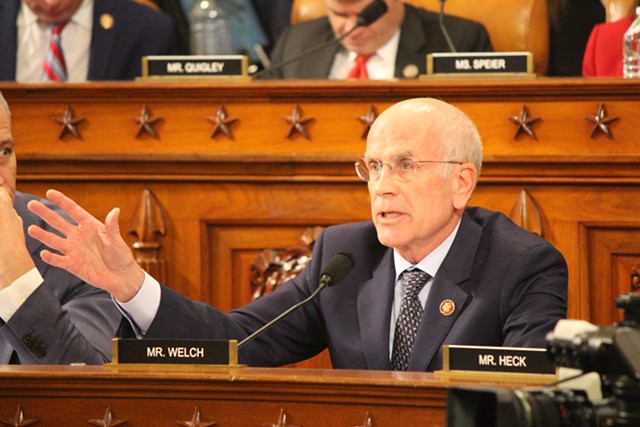
- Paul Heintz
- Rep. Peter Welch speaking during the House Intelligence Committee's impeachment inquiry on Wednesday
Rep. Jim Jordan (R-Ohio) was on a roll Wednesday afternoon. Near the end of the first day of public testimony in the U.S. House’s impeachment inquiry into President Donald Trump, the hard-charging Ohio Republican tore into his Democratic colleagues.
“Now there is one witness, one witness that they won’t bring in front of us — they won’t bring in front of the American people,” Jordan said. “And that’s the guy who started it all: the whistleblower.”
He was referring to the unnamed Central Intelligence Agency analyst who first sounded the alarm in August that Trump may have halted military aid to Ukraine in order to secure an investigation of former vice president Joe Biden. “This anonymous so-called whistleblower,” Jordan continued, “who is the reason we’re all sitting here today — we’ll never get a chance to question that individual.”
Rep. Peter Welch (D-Vt.) saw his opening. “I’d say to my colleague,” Welch said, turning to face Jordan, “I’d be glad to have the person who started it all come in and testify.” He gestured to the witness chair. “President Trump is welcome to take a seat right there.”
The audience, which had kept quiet through hours of sober testimony, burst into laughter. A clip of the exchange soon went viral. “Don’t sleep on @PeterWelch,” Rep. Alexandria Ocasio-Cortez (D-N.Y.) wrote on Twitter as she shared the video with millions of followers. “He’s great.”
Later that afternoon, Welch ran into Ocasio-Cortez as he walked from the hearing room to his office. “Great job earlier today,” she called to him. “When you can hear the laughs on C-SPAN, you know it’s loud!”
It was a brief moment of levity in a day otherwise freighted with seriousness. After weeks of taking depositions behind closed doors, Democrats on the House Permanent Select Committee on Intelligence were finally making their case to the public that Trump had abused his power and should be removed from office. The president, they alleged, had used instruments of American diplomacy to further his own reelection prospects.
“If this is not impeachable conduct, what is?” Rep. Adam Schiff (D-Calif.), the committee’s chair, asked as he called the hearing to order Wednesday morning.
Seated before Schiff at the witness table were two veteran diplomats who had grown unsettled by the White House’s alleged meddling in Ukrainian affairs: William Taylor, the U.S. ambassador to Ukraine, and George Kent, the deputy assistant secretary of state for European and Eurasian Affairs.
In opening statements to the committee, both men described the emergence of a shadow foreign policy more concerned with Trump’s domestic political agenda than long-standing U.S. support for Ukraine. The president’s personal lawyer, Rudy Giuliani, had attempted “to gin up politically motivated investigations,” Kent told the committee, and those efforts had “infect[ed] U.S. engagement with Ukraine.”
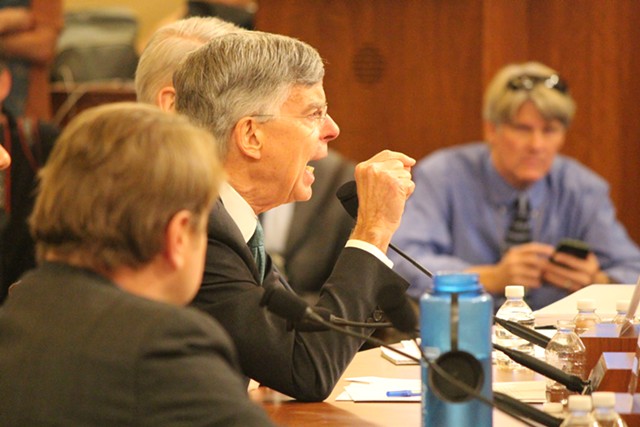
- Paul Heintz
- U.S. Ambassador William Taylor testifying before the House Intelligence Committee on Wednesday
Many of the diplomats’ most alarming allegations had already been publicized following their closed-door depositions last month. But in his opening statement on Wednesday, Taylor leveled a new charge that could more closely tie the president to demands for an investigation of Biden and his son, Hunter, who served on the board of a Ukrainian energy company.
According to Taylor, one of his embassy employees had recently described overhearing a phone conversation in a Kiev restaurant between Gordon Sondland, the U.S. ambassador to the European Union, and Trump. “The member of my staff could hear President Trump on the phone, asking Ambassador Sondland about ‘the investigations,’” Taylor said. “Ambassador Sondland told President Trump that the Ukrainians were ready to move forward.”
When the embassy staffer asked Sondland what Trump thought about Ukraine, according to Taylor, the E.U. ambassador said that the president “cares more about the investigations of Biden.”
In an interview outside the hearing room soon after Taylor revealed the Sondland exchange, Welch said that it “just really cements the fact that the president’s focus was on the investigations.” He added, “That was his concern with Ukraine.”
Though most of Wednesday’s proceedings were conducted by Schiff, Rep. Devin Nunes (R-Calif.) and their designated staffers, each committee member was afforded five minutes to question the witnesses. Welch used his time — after inviting Trump to testify — to question the extent of presidential power.
“Is there a limit?” he asked. “There is, because our Constitution says no one is above the law. And that limit is that one cannot — even as president — use the public trust of high office for personal gain.”
Welch noted that three key events had taken place on three consecutive days in July.
On July 24th, he recalled, special counsel Robert Mueller had taken questions from Congress about his investigation into Russian efforts to sabotage the 2016 election. “He established beyond doubt that it was the Russians who interfered in our election,” Welch said. “And he expressed a fear that that would be the new normal.”
On July 25th, Welch pointed out, Trump had placed a now-infamous phone call to Ukrainian President Volodymyr Zelensky during which Trump requested an investigation into the Bidens.
And on July 26th, Welch said, Taylor’s embassy employee had overheard Sondland’s call with Trump.
“So this is the question: The new normal that [former FBI] Director Mueller feared — is that a new normal that you fear?” Welch asked Taylor. “That a president — any president — can use congressionally approved foreign aid as a lever to get personal advantage in something that is in his interest but not the public interest?”
“That should not be the case, Mr. Welch,” Taylor said.
Disclosure: Paul Heintz worked as Peter Welch’s communications director from November 2008 to March 2011.








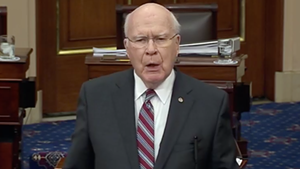
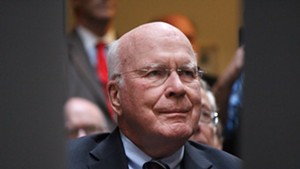

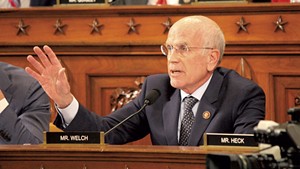
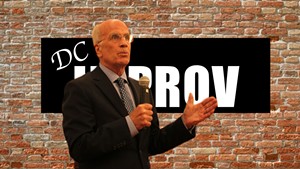




Comments (44)
Showing 1-25 of 44
Comments are closed.
From 2014-2020, Seven Days allowed readers to comment on all stories posted on our website. While we've appreciated the suggestions and insights, right now Seven Days is prioritizing our core mission — producing high-quality, responsible local journalism — over moderating online debates between readers.
To criticize, correct or praise our reporting, please send us a letter to the editor or send us a tip. We’ll check it out and report the results.
Online comments may return when we have better tech tools for managing them. Thanks for reading.